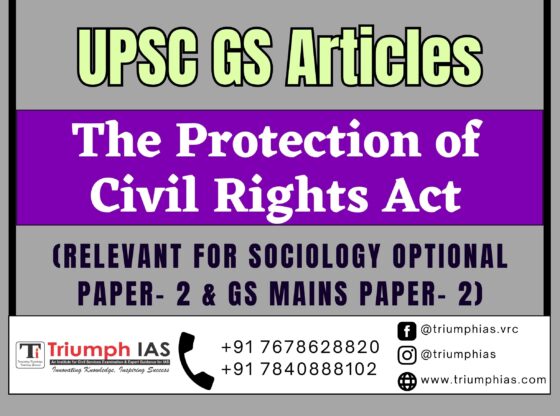The Protection of Civil Rights Act
Relevant for sociology optional Paper- 2 & GS Mains Paper- 2

The Protection of Civil Rights Act (PCRA) is a crucial piece of legislation in India that aims to protect and promote the civil rights of marginalized and discriminated communities. It was enacted in 1955, and since then, it has been amended several times to ensure that it remains relevant and effective in addressing the evolving needs of the society.
The PCRA seeks to eradicate caste-based discrimination, which has been a long-standing problem in India. It provides legal provisions to safeguard the rights of Dalits, who are the most vulnerable section of the Indian society. The Act defines and criminalizes practices such as untouchability, social boycotts, and the imposition of social disabilities. It also empowers the state to take stringent measures to punish those who violate the provisions of the Act.
The PCRA recognizes the importance of education in promoting equality and social justice. It mandates the establishment of special courts to handle cases related to civil rights violations. These courts are equipped with the necessary infrastructure and resources to ensure speedy and fair trials. The Act also provides for the appointment of special officers to investigate complaints of discrimination and initiate legal action against the offenders.
One of the key provisions of the PCRA is the provision of affirmative action for the upliftment of Dalits. This includes reservations in education, employment, and public services. The Act recognizes that the historical oppression of Dalits has created a need for such affirmative action to level the playing field and provide them with equal opportunities. However, there has been a debate around the effectiveness of reservations in achieving the desired outcomes. While proponents argue that it has helped in uplifting the socio-economic status of Dalits, critics argue that it has created a culture of entitlement and dependency.
The PCRA also provides for the establishment of the National Commission for Scheduled Castes (NCSC), which is a statutory body that monitors the implementation of the Act and safeguards the rights of Dalits. The NCSC is responsible for investigating complaints of discrimination, recommending measures to improve the conditions of Dalits, and promoting their welfare. The Commission has the power to summon witnesses, conduct inquiries, and recommend punitive measures against those found guilty of violating the provisions of the Act.
The PCRA has been instrumental in bringing about significant changes in the lives of Dalits. It has created awareness about their rights and empowered them to fight against discrimination. The Act has also led to the emergence of Dalit movements that have been instrumental in raising awareness about the issues faced by the community. These movements have played a crucial role in bringing about changes in the social and political landscape of the country.
However, despite the legal provisions, discrimination against Dalits continues to persist in various forms. The implementation of the PCRA has been marred by various challenges such as the lack of political will, the inefficiency of the justice delivery system, and the resistance of dominant castes. There have also been instances of abuse of the Act, where false cases have been filed against innocent individuals for personal gain or vendetta.
In recent years, there has been a growing demand to expand the scope of the PCRA to include other marginalized communities such as tribal communities and religious minorities. The government has also been criticized for diluting the provisions of the Act and not doing enough to address the issues faced by Dalits. The need for a more comprehensive and effective legislation to protect the rights of all marginalized communities in India is therefore more pressing than ever before.
In conclusion, the Protection of Civil Rights Act is a crucial piece of legislation that has played a significant role in promoting the civil rights of Dalits in India. The Act recognizes the historical oppression faced by the community and provides legal provisions to safeguard their rights. However, the implementation of the Act has been marred by various challenges, and discrimination against Dalits continues to persist. There is a need for a more comprehensive and effective legislation that addresses the issues faced by all marginalized communities in India. The government needs to take proactive steps to strengthen the implementation of the PCRA and ensure that justice is served to those who are discriminated against. This requires a collective effort from all stakeholders, including the government, civil society organizations, and the general public. Only then can we hope to create a society that is truly equal and just for all.
For more such free UPSC notes, Articles, News & Views Join our Telegram Channel. https://t.me/triumphias
Click the link below to see the details about the UPSC – Civils courses offered by Triumph IAS. https://triumphias.com/pages-all-courses.php


